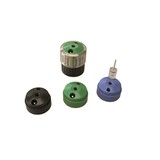Electrochemical detection (ECD)
Electrochemical detection (ECD) by KNAUER
What does ECD mean?
Electrochemical detection (ECD) for HPLC or UHPLC is an selective and sensitive detection technique that is applied in a number of analyses in the food industry. With its wide linear range and the high sensitivity it is the ideal detection technique even for trace amounts of compounds, which can be useful e.g. in the determination of lactose content of "lactose-free" products.
Detection principle
In amperometric electrochemical detection, the electrical current is measured resulting from oxidation or reduction reactions. A sample is introduced into the HPLC and separated on the chromatographic column. The column is connected to an ECD cell, a tiny electrochemical reactor where a reaction takes place at an electrode. Electrochemically active substances that elute from the column undergo an electrochemical reaction, electrons are transferred resulting in an electrical current that is recorded.
Advantages of electrochemical detection in food applications
Compared to HPLC methods applying UV or RI detectors, applications with electrochemical detection are far more sensitive.
- Save time: Measurement of low analyte levels without preconcentration of samples
- Save sample: Very low sample volume is required
- Save money: Elimination of matrix interferences by selective detection of analytes of interest without complex sample preparation
Who?


In this webinar, Lisa Loxterkamp and Jan Wendrich will be your hosts.
Save event to calendar

